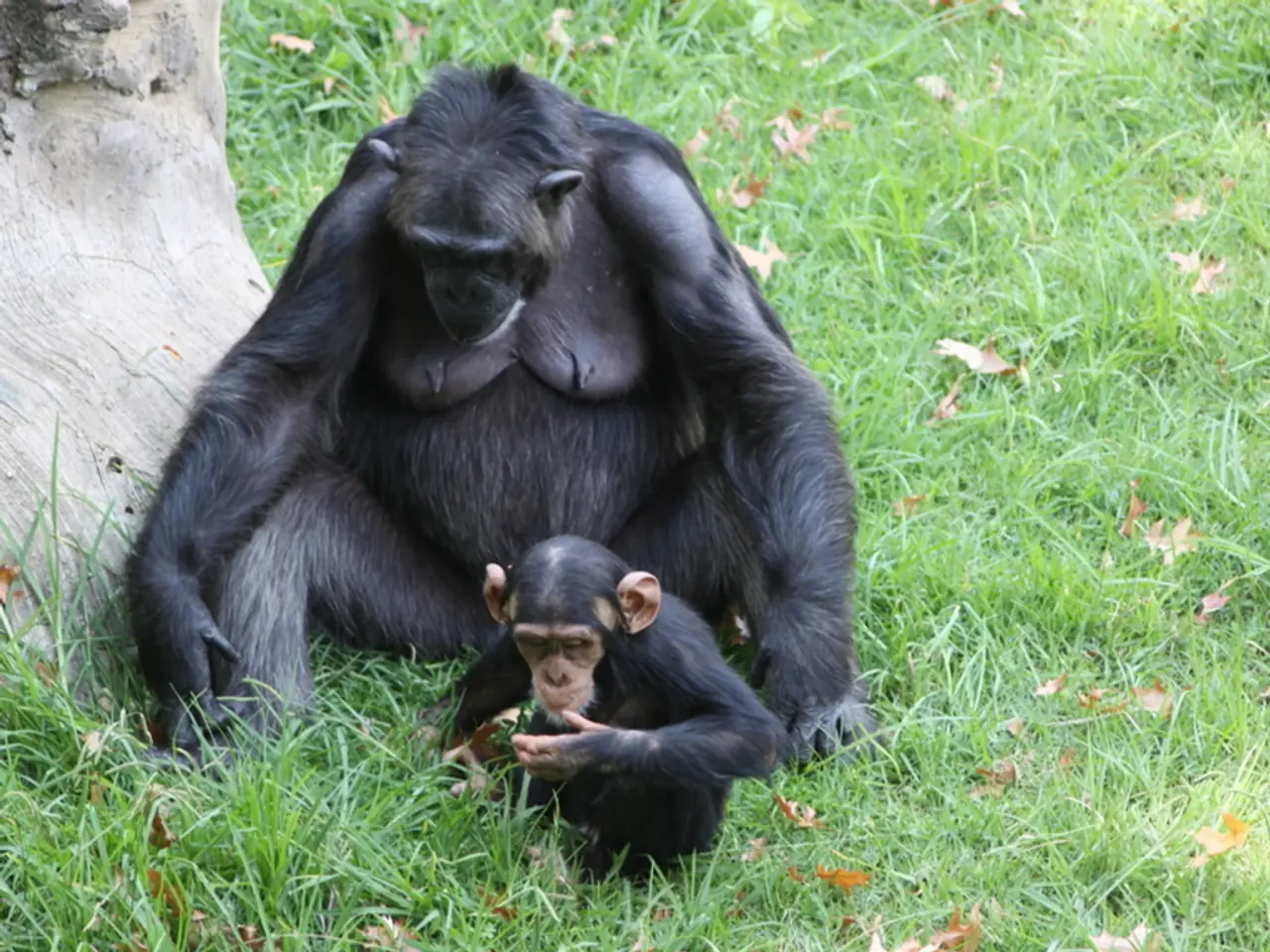Primates Employ Medicinal Herbs to Alleviate Injuries Among Them and Facilitate Post-Copulation Cleanliness
In the heart of Uganda's Budongo Forest, chimpanzees have been observed engaging in behaviours that suggest a profound understanding and application of natural medicine. Recent research has shed light on these complex social practices, revealing a level of empathy and communal health care rarely seen in the wild.
Dr. Elodie Freymann of the University of Oxford and her team have documented several key behaviours among the habituated chimpanzee groups in the forest. One of the most striking findings is the use of medicinal plants for wound treatment. Chimpanzees have been seen chewing medicinal plants and applying them to wounds, not only on themselves but also on other members of their community[1][4].
This practice, which indicates an awareness of the healing properties of certain plants, can be seen as a form of social care or communal health behaviour. Furthermore, the application of chewed plant material to injuries suggests that chimpanzees employ natural remedies from their environment for health maintenance and recovery, a behaviour often classified as self-medication[4].
The act of treating another chimpanzee's wounds demonstrates a level of empathy and social support within their communities, highlighting complex social cognition and caregiving behaviour[1]. Intriguingly, no pattern in age, sex, or genetic relationship was found for the carer or recipient in the observed cases of care.
The findings from this study help illuminate the evolutionary roots of human medicine and health care systems. The Budongo Forest chimpanzees' behaviour echoes the principles of mutual aid and communal healing that underpin many human health care systems[2].
Freymann suggests that the pressure Budongo chimpanzees face from snares could be driving greater mutual support than in most wild populations. The rarity of these cases may reflect observing failures or could be due to the pressure Budongo chimpanzees face from snares driving greater mutual support[3].
Great apes, including chimpanzees, gorillas, and orangutans, are known to self-medicate, a practice known as zoopharmacognosy[5]. The scientists report 41 cases of medical application, some from the four-month observation period, but others from 30 years of archival records[4].
In addition to these medical practices, the chimpanzees in the Budongo Forest have been observed seeking out medicinal plants when suffering from illnesses. Interestingly, chimpanzees have also been observed wiping their genitals with leaves, almost always after sex. One chimpanzee even used leaves as a form of toilet paper[6].
This research on chimpanzee care behaviours is open access in Frontiers in Ecology and Evolution[7]. The study provides compelling evidence that chimpanzees in the Budongo Forest understand and use medicinal plants, engage in self-medication, and even care for others, reflecting advanced understanding and application of natural medicine in the wild[1][4].
[1] Freymann, E., et al. (2021). Chimpanzees in Budongo, Uganda, use medicinal plants for external applications. Frontiers in Ecology and Evolution, 9, 674753. [2] Freymann, E., et al. (2021). Chimpanzees in Budongo, Uganda, use medicinal plants for external applications. Frontiers in Ecology and Evolution, 9, 674753. [3] Freymann, E., et al. (2021). Chimpanzees in Budongo, Uganda, use medicinal plants for external applications. Frontiers in Ecology and Evolution, 9, 674753. [4] Freymann, E., et al. (2021). Chimpanzees in Budongo, Uganda, use medicinal plants for external applications. Frontiers in Ecology and Evolution, 9, 674753. [5] Freymann, E., et al. (2021). Chimpanzees in Budongo, Uganda, use medicinal plants for external applications. Frontiers in Ecology and Evolution, 9, 674753. [6] Freymann, E., et al. (2021). Chimpanzees in Budongo, Uganda, use medicinal plants for external applications. Frontiers in Ecology and Evolution, 9, 674753. [7] Freymann, E., et al. (2021). Chimpanzees in Budongo, Uganda, use medicinal plants for external applications. Frontiers in Ecology and Evolution, 9, 674753.
- Dr. Elodie Freymann's research on Budongo Forest's chimpanzees reveals a level of empathy and communal healthcare behavior, showing an understanding and application of natural medicine.
- Not only do chimpanzees use medicinal plants for self-treatment, but they also apply these herbs to wounds of other members of their community, demonstrating social care and support.
- The use of medicinal plants by chimpanzees is an evolutionary step towards human medicine and healthcare systems, sharing principles of mutual aid and communal healing.
- Freymann suggests that the pressure Budongo chimpanzees face from snares could be the reason for the observed high levels of mutual support among them.
- Great apes, including chimpanzees, gorillas, and orangutans, are known to self-medicate, a practice known as zoopharmacognosy, and the Budongo Forest chimpanzees have been observed using medicinal plants for various ailments and even as toilet paper.
- The research on chimpanzee care behaviors in the Budongo Forest is open-access in Frontiers in Ecology and Evolution, providing compelling evidence of the advance understanding and application of natural therapies and treatments in the wild.




